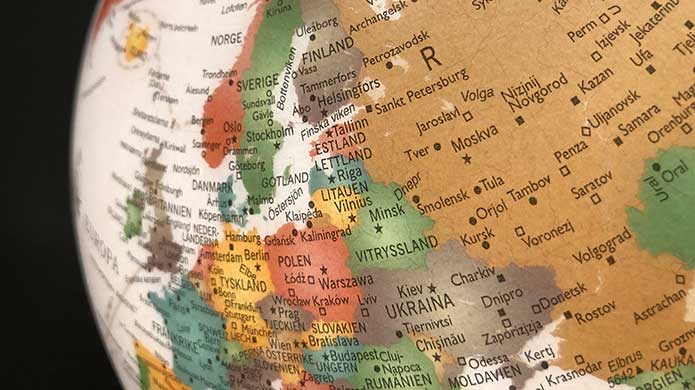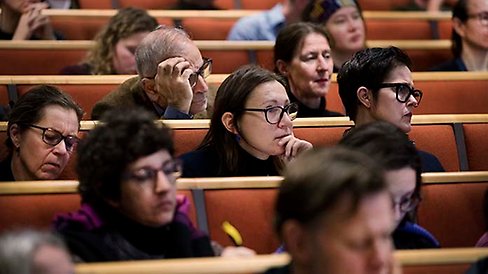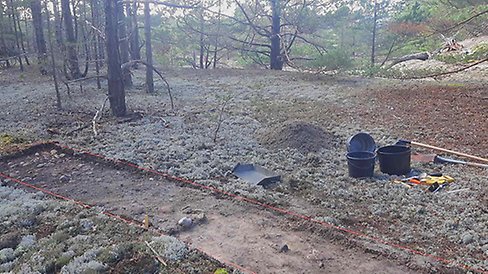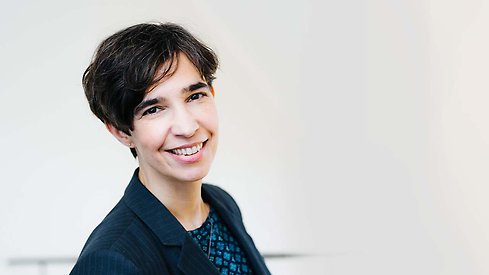“The war must be positioned in a wider context” – two researchers from Södertörn on the conflict in Ukraine
Russia has once again built up its military presence along Ukraine’s borders and appears to be preparing a military invasion, with the Putin regime’s demands including no more Nato expansion eastward. However, Russia’s reasons for these demands, or even invading their neighbour to the south, are more numerous and go much further back in time, according to researchers Olena Podolian and Roman Horbyk, both with roots in Ukraine.

There is great uncertainty about how the conflict between Russia and Ukraine will develop. Since the spring of 2021, the level of the threats aimed at was once one of the Soviet Union’s biggest republics has gradually increased, escalating rapidly over the last few months. There is great concern, not least among the population, but also within the EU, as the conflict is affecting the stability of the entire region.
Olena Podolian is a political scientist, originally from Ukraine. Her research includes how post-Soviet states have developed after 1991, including her homeland. Roman Horbyk, also from Ukraine, is a researcher in media and communication studies, with a focus on media, war, culture and media history, primarily in Eastern Europe.
What is happening in Ukraine?
“What we are really seeing right now is a continuation of what happened in 2014, when Russia annexed Crimea and invaded parts of the Donbas region in eastern Ukraine. However, this escalation different to that of spring 2021, when they did the same thing, because the number of soldiers and military materiel is on a considerably greater scale. Another factor is that it is happening in several places simultaneously, along the borders in the north, east and south, which means that troops are threatening entirely new areas in eastern and northern Ukraine, including the capital. These areas are important from several perspectives, such as industry, education and the military,” says Roman Horbyk, PhD in media and communication studies.
Both researchers say that to understand what is happening in the area, and why it is happening now, we have to widen our perspectives. This escalation is no isolated event and developments in Belarus, in particular, have strengthened Putin’s regime, say both researchers. Belarus’ authoritarian leader, Alexander Lukashenko, brutally crushed popular protest after the 2020 elections and has subsequently strengthened ties with Russia, Horbyk explains. The Russian military has moved surface to air missiles and other equipment to Belarus on the pretext of a joint exercise in February.
“All this is happening against the background of intensifying military rhetoric from state-controlled media in both Russia and Belarus. On several occasions, Lukashenko has made statements such as ‘we are not looking for war but the West is forcing us to take such action’, and he is accusing Ukraine of amassing radical nationalists at the border. A programme host on Russia Today said in a broadcast that ‘we will take your constitution and burn it and you together on the streets of Kyiv’,” says Horbyk.
Why is this happening now, and what are Russia’s intentions?
“Ukraine is symbolically and economically important for Putin as without Ukraine, Russia loses some of its connection to Europe. It is about the idea of re-establishing the Russian empire, and 2022 is symbolically important as it is the centenary of the founding of the Soviet Union. Ukraine was, in terms of its population, the second largest Soviet republic and it is incredibly important for Putin to keep the country within his sphere of influence. Without Ukraine, Russia cannot be an empire,” says Olena Podolian, PhD in political science.
Russia has repeatedly stated that they will not tolerate any expansion to NATO. They want troops located in former Soviet republics after 1997 to be withdrawn and Ukraine not to participate in any NATO-led exercises. Olena Podolian also links the timing of these demands to the US getting a new president a year ago.
“With the former president, Donald Trump, there was a sense of agreement on the question of NATO, and now Putin wants to show that he won’t tolerate any violation of the status quo that has been in place for the past few years. During his presidential campaign, President Biden indicated tougher measures and a stronger NATO,” she says.
The current situation illuminates another conflict, that between authoritarian and democratic states. According to the two researchers from Södertörn University, the issue is that Russia cannot accept functioning democracies in the region where they historically held power. It is also about undermining the EU.
“We are talking about adapting the Russian empire to new circumstances. In 1922, the Soviet Union was an adaptation to the situation, with a division into republics to control the region. They want to retake control of areas in which Russia formerly had exclusive rights over both domestic and foreign policy. But we have seen that they find it difficult to accept democracy, so Putin does not like Ukraine. It may be a democracy with problems – but it is still a democracy, says Horbyk.
What does the conflict mean for ordinary people and the region as a whole?
Olena Podolian has recently returned from Kyiv where, like Roman Horbyk, she has friends and family. Day to day life rolls on in the capital, people run their errands, go shopping and to the hairdressers. There is no talk of war, but if you ask the worry is there, below the surface.
“It’s nothing people talk about day to day, but around half the population think there could be war. There is also opinion saying that the government should be more proactive. If there is a war, it would mean millions of people being forced to flee. The consequences could be terrible, just look at the rocket attack on Mariupol [Donetsk oblast] in January 2015, when housing was hit instead of a military target. There are also chemical factories, gas pipelines and nuclear power stations. The risk of mistakes is huge,” says Podolian.
Horbyk says that stability in the region is long gone, and the situation is increasingly unstable. It is serious, but he thinks we should stay calm, saying that Russia is not invincible. However, the chances of Putin backing down with the help of diplomacy and dialogue alone are small, he says.
“Keir Giles, from the Chatham House thinktank, recently wrote a report on the Kremlin’s actions, showing that their statements indicate that the Russian elite see dialogue as a sign of weakness. They have threatened nuclear war, but have backed away from those threats if there were strong reactions from the rest. Readiness for a military response is essential in getting Russia to the negotiating table,” says Horbyk.
Ultimately, for Ukraine, it is about the right to decide over their own country, and to enter the international agreements they wish to themselves.
“Russia has no right to put itself above Ukraine, or Belarus, or Kazakhstan. People often use chess as a simile, but the pieces are not even Russia’s to play with,” says Podolian.
Page updated
16-02-2023





